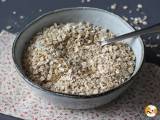How much sugar can you consume a day without harming your health?

Sugar, which is present in a multitude of foods, from fruit to industrialized products, is one of the great villains of the modern diet. But what is the maximum amount of sugar we can consume per day without harming our health?
Why worry about sugar?
Excessive sugar consumption is associated with a number of health problems, such as
- Obesity: Sugar provides too many calories and too few nutrients, contributing to weight gain.
- Type 2 diabetes: Excess sugar overloads the pancreas, increasing the risk of developing diabetes.
- Cardiovascular diseases: High sugar consumption can increase levels of triglycerides and bad cholesterol, favoring the development of heart disease.
- Dental problems: Sugar feeds the bacteria that cause tooth decay.
What is the ideal amount?
The World Health Organization (WHO) recommends that the consumption of added sugars should not exceed 10% of daily calories. Ideally, this consumption should be even lower, at around 5%.
But what are added sugars?
These are those added to food during processing or preparation, such as common sugar, honey and the sugar present in soft drinks, industrialized juices and processed foods.
How to reduce sugar consumption?
Read labels: Check the amount of sugar in the food you eat.
Limit processed foods: Prefer natural and minimally processed foods.
Reduce your consumption of sugary drinks: Swap soft drinks and industrialized juices for water, tea and natural juices.
Cook at home: Prepare your own meals using fresh ingredients and reducing the amount of added sugar.
Conclusion
Sugar, when consumed in excess, can cause serious damage to your health. By reducing your consumption of added sugars and opting for healthier foods, you'll be taking a big step towards improving your quality of life.
Remember: the key to a healthy diet is moderation. Consult a nutritionist to draw up a personalized diet plan and achieve your health goals.
Extra tips:
Watch out for hidden sugars: Sugar can be present in foods you wouldn't think of, such as sauces, breads and sausages.
Fruit: yes! Industrialized juices: no! Fruit is a natural source of sugar and fiber, but processed juices are high in added sugar and low in fiber.
Gradually: Reducing sugar consumption gradually is easier and more sustainable.
Read more
 Mirella Mendonça
Mirella Mendonça


Comments